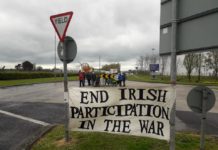Ultán Gillen focuses on the role Europe’s strongest communist party plays in the Greek workers’ uprising against the bankers’ agenda.
“They say the only way of salvaging our economy is more austerity, but that’s a total lie.” Nicolaos Danizis, a 60-year-old shipyard worker protesting at the Greek parliament, cut straight through all the propaganda from the Greek government, the EU, the IMF, and the right-wing media.
This is the same lie that we in Ireland have been told every day for nearly two years. It is a lie we will be hearing for years to come from governments in both Dublin and London as they attack public services, jobs and wages. And like in Ireland, the Greek so-called austerity measures are intended to bail out bankers, speculators, and corrupt politicians at the expense of ordinary people.
The details of the price demanded from the people of Greece by the EU, the IMF, the banks, and the international financial speculators are horrific. In the words of the Observer newspaper, the measures “will wipe out almost every right won by workers over the past 30 years.”
Greek public sector workers, since the 1940s, have received fourteen months’ payments instead of twelve because their wages are so low; pensioners, whether they receive public or private sector pensions, receive the same. The government will abolish the thirteenth and fourteenth payments to both workers and pensioners. Millions of people will lose one Euro in seven from their income on the basis of this measure alone.
There are other cuts aimed at the low paid, the unemployed, the sick, young people and pensioners – in short, cuts targeting the most vulnerable in society. The pensions system is being overhauled, with the age of retirement increased and pensions cut. VAT is the most unfair type of taxation, hitting the poor much harder than those with high incomes because it targets the basic necessities. Greek VAT, which was increased only two months ago, is to increase further, from 21% to 23%.
Unemployment and other benefits will be cut, and spending on public services such as hospitals and schools will be drastically reduced. Wages are being frozen for three years, and thousands will be sacked from the public sector and local government. The Greek elite are also taking the opportunity to remove collective bargaining rights won after decades of hard struggle. As one Greek political commentator noted, “Greece is going to become a much poorer place; schools will be poorer, hospitals will be poorer, people will be poorer.”
The measures are a comprehensive attack on the Greek working class. They attack the living standards of Greek workers, the rights of workers to fight for better conditions, and the rights of the Greek people to determine their own future. The Greek working class is fighting back. Already, there have been several general strikes, and protests in 75 Greek cities. Unprecedented numbers have been mobilised against the so-called bailout plan.
The central force in opposing these cuts, which are being implemented by the social democratic PASOK government, is the KKE, the Greek Communist Party. As Greece’s oldest functioning political movement the KKE has grown out of generations of working class struggle, and has deep roots in both the cities and the countryside. Founded in 1918 the KKE helped build Greece’s strong socialist tradition, with its culture of mass demonstrations in support of the demands of ordinary people.
It was only the interference of the British Empire in the Greek civil war that followed World War II that prevented a KKE-led revolution. The KKE has continued to work hard whatever the circumstances, the party’s present leadership first becoming politically active when it was an underground organistion opposing the CIA-backed fascist military junta that ruled Greece from 1967 until 1974.
Currently the third largest party in the Greek Parliament, with 21 seats, and has two MEPs who are members of the European United Left–Nordic Green Left. This political base is built on decades of activity in local communities, trade unions, in workplaces, in schools and in universities throughout Greece.
The May 5 burning of a branch of a bank which resulted in the deaths of three people, including a pregnant woman, allowed the media to remove their focus from the real story of the Greek protests, the central role of an organized and disciplined revolutionary political party.
The Greek working class is on the front line of the international struggle provoked by the current crisis. As the 100,000 demonstrators brought onto the streets of Athens by the KKE on May 15th chanted, “The winner must be the people”.





